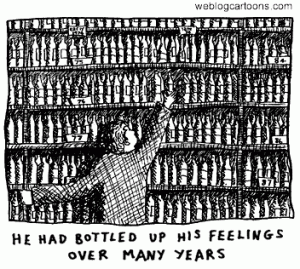
Comfort Zone
 What Is Your Comfort Zone?
What Is Your Comfort Zone?
And no, it’s not just the place where your cat curls up to sleep! It is your personal mental place where things are familiar and comfortable, neither too easy nor too hard and where you feel in control of your environment, with low levels of stress. You could think of it as that place between the fire and the ice, where you are not too hot and not too cold. That sweet spot is different for everyone.
Inside that comfort zone we can ignore or deny the things we might fear – the big things like flying, or heights or the less obvious fears like being rejected or failing.
Building Barriers
We all build “comfort zones” around ourselves – boundaries between what makes us feel comfortable, and uncomfortable. They keep us in the Goldilocks zone, where we are neither too hot nor too cold but just right. Staying inside those boundaries can stop us from doing something stupid or reckless, sort of burying our heads in the sand.
Restricting and Constricting
But very often, those same boundaries stop us from growing as people, or from developing fully, or experiencing new things. They can keep us stuck in the same old rut. Maybe in the past you failed an exam or got rejected by someone you were interested in. Perhaps you tried for a promotion or to get a new job. If you did not achieve any of those things, sometimes we tend to just keep our head “below the parapet”, so we don’t fail or get rejected again. That can mean not trying for an exam or not getting close to another person or not looking for promotion or a new job. Being “below the parapet” keeps us in a comfort zone where we never again experience the pain of failure or getting rejected, because we don’t try for something new or improved. But equally, although we do not risk failure, neither do we seize the opportunity of something really good coming our way. 
One problem can be that while our barriers are designed to keep us comfortable, they may be based on an untruth, so that we lock ourselves into a comfortable rabbit hole, where we never get to experience the truth about ourselves and others. We may have created barriers around our comfort zone that say, “I can’t do that”, or “nobody will ever like me”, based on a painful episode where we didn’t understand something or got it wrong or picked someone who wasn’t a good fit with us at the time. The comfort zone is not the problem, it’s the belief that created the barriers, that you will “never” understand something or “always” be rejected that keeps you locked away in there.
Cartoon by Dave Walker. Find more cartoons you can freely re-use on your blog at http://www.weblogcartoons.com/
But just because something happened in the past does not necessarily mean it will happen again in the future, especially if you make changes that mean your environment is different. But if you stay within the comfort zone, and don’t challenge wrong beliefs, you may very well behave in ways that will keep you locked in there, because you will not try to get past those wrong beliefs. For instance, if you fear not passing an exam, you will not try to learn that subject because “what’s the point?” or if you fear never having a relationship, you will not try to meet people because “they won’t like me anyway”. Deep inside you will expect to fail or be rejected again and your mind will do all it can to keep you away from what it fears will hurt you, keeping you IN your comfort zone and AWAY from what could be good new experiences.
Is Your Comfort Zone Holding You Back?
Have you ever thought about being in a comfort zone before? About hiding your head in the sand? About spending time on social media, rather than talking face to face? Perhaps you have never thought about comfort zones before? Can you answer “Yes” to these questions?
- Are you making as much money as you’d like?
- Are you happy in your relationship or are you happy not to have one?
- Are you happy with your job?
- Do you love meeting new people and getting to know them?
- Are you able to set new goals for yourself and achieve them?
If you were able to give a resounding “yes” to the questions above, you probably aren’t being held back by any comfort zones. If you answered no to any then you might want to work through the points below.
First, draw up a list of the worst possible things you can imagine happening. And be honest with yourself. No one else is going to see the list unless you show them.
- What are your deepest fears?
- What aspects of your life don’t you enjoy? And why?
- If you don’t enjoy meeting new people, ask yourself why that is.
- What is the worst thing you can imagine happening regarding meeting someone new?
Now, secondly, write down what would happen – what the consequences would be – if these worst fears happened.
- Could you live with those consequences? For instance, what would be the consequence of being rejected again or of failing that exam or interview again?
- Would you be able to live with that? You might be surprised at how insignificant most of the possible consequences are, and that you could live with them if necessary.
F.E.A.R.
FEAR can be said to stand for False Evidence Appearing Real
That false evidence is what keeps us behind those barriers, in our comfort zone. Fear appears much bigger inside our heads than it is in reality! We often work ourselves into a sweat, or spend sleepless nights, terrified of what might be, when it would be no big deal if it happened and it may not. As with most other things, we’d simply pick ourselves up and continue on our way.
Swallow That Frog!
There is business advice out there that tells you to “swallow the frog (or the toad) first thing every morning”. Now, that’s not a real frog of course (they’re endangered) but it stands for “Do the thing you most hate or fear, first thing in the morning and the rest of your day will be easy because the worst thing is already out of the way”. Once you know what your fears are, and you understand and accept the consequences, immediately do the thing you fear most. Yes, step out of your comfort zone! Refuse to let fear control you. Tell your fear, “Thanks for trying to protect me, but I’m going to do it anyway.” And then just do it. Then do it again. And again. The first few times, you WILL be uncomfortable. Expect that and accept it. Fear won’t vanish overnight. But it will go away after your mind understands that the fear is groundless.
NOT Reckless
Don’t go too far in the opposite direction and become reckless either. Make sure you have looked at your fears and understand the consequences of overcoming them. There is a big difference between blindly leaping into the unknown, and taking a calculated risk. Before acting, take a few minutes to think about the action you want to take, consider the consequences, and ask if you’re willing to accept them. If you are, go for it. If you’re not, that’s all right! Don’t feel like you have to push yourself beyond what you’d be willing to accept. You can put the issue on the back burner for a while and reconsider later.
The point is to stop letting fear make your decisions, and start making them yourself. It will take some time to get used to this new way of thinking, but before long you’ll automatically begin questioning your fear and stop letting it control you. Once that happens, there is no telling the levels of success and happiness you can reach!